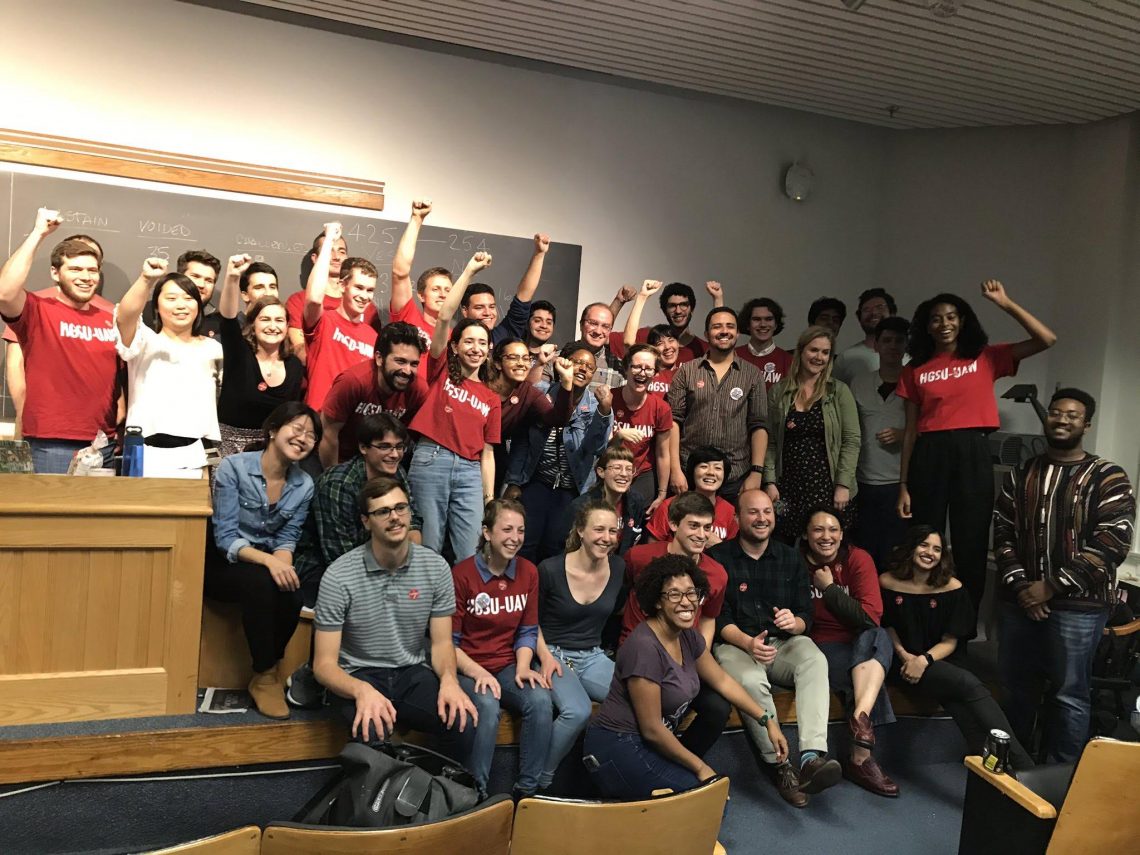By Sammie Purcell
BU News Service
BOSTON — The Harvard Graduate Student Union voted almost unanimously in favor of striking Friday after students argued the university has stalled contract negotiations for more than a year.
Of the 4,500 union members, a little over 2,400 voted over the past two weeks, and 90.4% of all ballots cast voted yes to authorize a strike, according to the union’s Twitter account.
“The vote passing with such overwhelming numbers is an impressive display of solidarity,” said first-year graduate student Libby Federici. “My hope is that the administration cannot choose to ignore graduate student workers anymore.”
Union workers argued the university has refused to budge on key issues since contract negotiations began a year ago. According to Rachel Sandalow-Ash, a third-year law student and research assistant, the same issues have been sticking points since the union was formed.
“Student research and teaching assistants at Harvard voted to form our union in April 2018,” said Sandalow-Ash, who is also a member of the union’s bargaining committee. “Since then, we’ve been trying to win a contract that secures fair pay, comprehensive and affordable healthcare and protections against discrimination and harassment.”
Federici said she feels “invigorated” by the vote.
“I think we’re all really grateful for the work the bargaining committee has done,” she said.
Sandalow-Ash said she isn’t sure why the university continues to delay negotiation on these particular issues.
“Harvard is the wealthiest university in the world,” she argued. “They have an endowment of $39 billion and yet, as a research assistant at the law school, I make $12 an hour, which is the Massachusetts minimum wage.”
In a statement to BU News Service, a Harvard spokesperson said that the university has not changed its position on the call to strike and still continues to approach negotiations “in good faith.”
For each of the unions proposals that Harvard has not agreed to, they university has laid out their reasoning on Harvard’s website. The university cites Title IX violations as part of its argument fighting against third-party representation in harassment cases.
“An arbitration process available to bargaining unit members would carve out those student workers as having a separate process not available to all other students,” the statement read. “This is inconsistent with both current Title IX regulations that demand fair and equitable processes for all students.”
The university also cited concerns about a third-party arbitration process leading to cross-examinations between the victim and the alleged offender and the fact that a third party would not have the authority to punish offenders.
The university spokesperson provided other links that show successful negotiations they’ve had with the union to date, including negotiations of compensation and benefits. The university has proposed raising the minimum hourly pay rate to $15 for non-salaried student workers and a minimum of $17 an hour for hourly instructional workers.
The university argues its proposed wage increases are in line with final contracts that United Auto Workers (UAW) has negotiated at other universities.
On its website, the Harvard Graduate Student Union has listed counterpoints to the university’s arguments. The union said Harvard’s proposals allowed for a “neutral grievance procedure” in other issues but not issues of non-discrimination or harassment.
The union also argued their proposed procedure is an additional option for students who would still be allowed to file Title IX complaints and the university would still have the ability to do their own investigation. Other points made on their website claim that cross-examination would not be required unless the university decided to defend the accused and that punishment of a guilty party will always be left to the university.
According to Sandalow-Ash, the union met with the administration on Wednesday for a bargaining session after Friday’s successful vote, but the results of Wednesday’s meeting were not yet disclosed by Friday morning.
“We hope that in response to this overwhelming strike vote, passed with over 90% of ballots cast, that the university will realize that student workers at this university are standing together and we’re not going to back down,” Sandalow-Ash said.
If the university continues to hold firm on their positions, the union will begin to plan a strike, she said.
“We haven’t set a strike deadline yet,” Sandalow- Ash said. “When we do make that decision, that doesn’t mean that a strike is definitely going to happen. It means that we set a deadline by which the university needs to meet our demands.”
If the union were to go on strike, Sandalow-Ash said student workers would stop all teaching and research activities.
“There are something like 4,000 or 4,500 student workers working as teaching and research assistants,” she said. “So this would have the potential to really stop a lot of the core functions of the university.”






[…] Boston University News Service 11/1 […]
[…] a strike deadline of Dec. 3, following the student workers’ overwhelming 2,425 to 254 vote (90.4% in favor) to authorize a strike,” the statement […]
[…] announcement comes nearly six weeks after 2,425 of the union’s estimated 4,500 members voted to authorize a strike. Of those who voted, about 90% voted […]